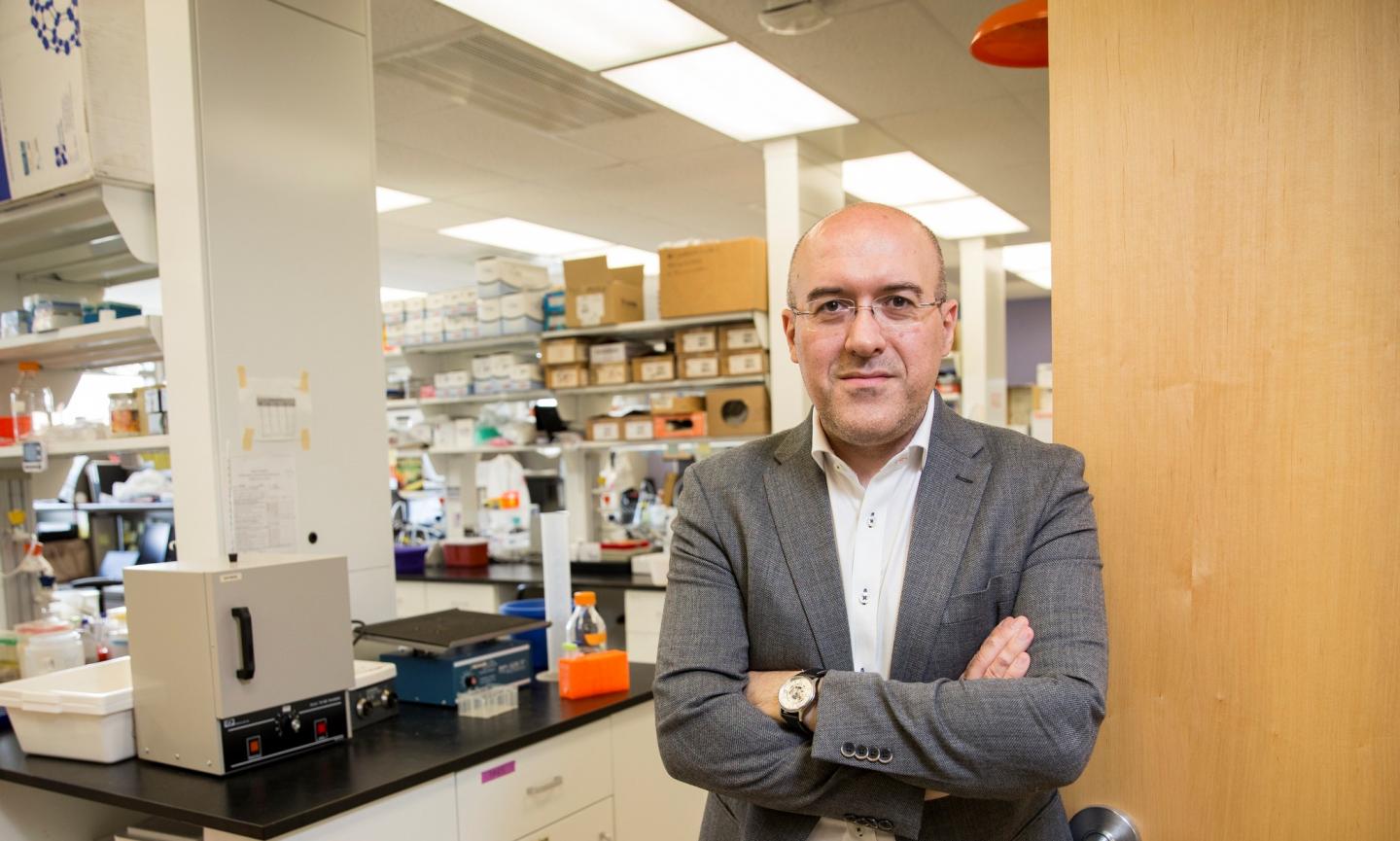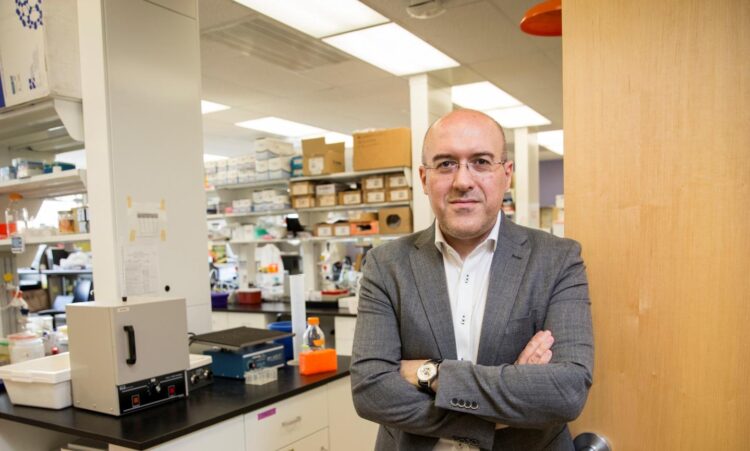
Credit: Temple University Health System
(Philadelphia, PA) – Each year, some 270,000 Americans die from sepsis, in which the release of normally helpful infection-fighting chemicals in the body triggers an unusually extreme immune response – powerful enough to cause life-threatening damage to blood vessels and organs. Risk of this severe response is increased in patients who experience abnormalities in heart function and a drop in blood pressure, or hypotension, despite treatment to keep blood pressure elevated.
Researchers at the Lewis Katz School of Medicine at Temple University (LKSOM), led by Konstantinos Drosatos, PhD, Associate Professor of Pharmacology at the Center for Translational Medicine, the Center for Metabolic Disease Research, and the Alzheimer’s Center at Temple at LKSOM, previously found that heart dysfunction and hypotension in sepsis are closely associated with a molecule known as B-type natriuretic peptide (BNP). Heart cells, when under stress, produce unusually large quantities of this peptide, which, in turn, acts to lower cardiac output, or how much blood the heart pumps in a given amount of time.
How BNP is increased and whether it can be targeted with drugs to treat cardiac dysfunction and hypotension remains unknown. But now, with the help of a new two-year $750,000 grant from the National Institute of General Medical Sciences (NIGMS), Dr. Drosatos and co-investigator and clinical lead Nina Gentile, MD, Professor and Associate Chair for Research in the Department of Emergency Medicine at LKSOM, plan to elucidate the link between BNP and severe sepsis. The research could lead to the discovery of new therapies to increase blood pressure and improve survival in septic patients.
“With the support of NIGMS, we are now able to further our investigation into the role of BNP in sepsis and to determine how well BNP can be combined with other early manifestations of the disease to predict survival in sepsis patients,” Dr. Gentile said.
“There are many variables that impact how sepsis manifests and how it affects individuals,” explained Dr. Gentile. To effectively study the role of BNP, the new project is broken down into two specific aims, investigation of the mechanisms that mediate BNP increase in the blood in sepsis and assessment of the role of BNP in reducing cardiac output and promoting hypotension in septic mice and patients. Dr. Drosatos will lead the basic research side of the project, while clinical studies will be headed by Dr. Gentile.
The project marks an important next step in the team’s research into BNP and cardiac dysfunction in sepsis. In earlier work, Matthew Hoffman, an LKSOM MD-PhD student who previously worked in Dr. Drosatos’s laboratory, identified a signaling pathway in heart cells that is linked to increased BNP production and reduced cardiac output. In studies in mice affected by sepsis, the researchers found that activation of a protein known as cJun N-terminal kinase (JNK) increases BNP expression and contributes to cardiac dysfunction. Additional investigations in mice revealed that when BNP is neutralized or decreased by blocking JNK activation in the circulation, blood pressure stabilizes.
In the truest sense of translational research, Mr. Hoffman will now take his findings from mice and work with Dr. Gentile’s clinical research team on the study of sepsis in human patients. BNP is a practical biomarker and potential therapeutic target in humans.
“In patients, by inhibiting the activity of circulating BNP directly, it may be possible to alleviate septic hypotension and improve survival,” Dr. Gentile said.
Dr. Gentile and Dr. Drosatos, along with cardiologists at Temple University Hospital, developed the clinical component of the research to include the measurement of laboratory markers in patient samples, as well as the use of noninvasive echocardiography in patients with sepsis of varying degrees of severity.
“Our echocardiography method allows us to monitor subtle changes in the wall of the heart, providing a very detailed view of how the heart is pumping blood,” Dr. Gentile explained.
The combination of highly sensitive echocardiography and BNP as a cardiovascular marker could be applied broadly to clinical assessment of sepsis, allowing doctors to quickly assess severity and better manage illness to improve patient outcome.
“We are very excited about this collaboration with Dr. Gentile,” Dr. Drosatos said. “The medical school has vast although still unexplored opportunities for translational research. Therapeutic targets and biomarkers that we identify in animals can be readily transferred into clinical studies in human patients.”
Both Dr. Drosatos and Dr. Gentile added that the new project also aligns with efforts at Temple to enhance translational research “from the lab bench to the hospital bed and back to the lab.” Such translational projects help expand the clinical research enterprise of the university, which is poised to become a front-runner in translational cardiovascular research.
###
About Temple Health
Temple University Health System (TUHS) is a $2.2 billion academic health system dedicated to providing access to quality patient care and supporting excellence in medical education and research. The Health System consists of Temple University Hospital (TUH); TUH-Episcopal Campus; TUH-Jeanes Campus; TUH-Northeastern Campus; The Hospital of Fox Chase Cancer Center and Affiliates, an NCI-designated comprehensive cancer center; Temple Transport Team, a ground and air-ambulance company; Temple Physicians, Inc., a network of community-based specialty and primary-care physician practices; and Temple Faculty Practice Plan, Inc., TUHS’s physician practice plan comprised of more than 500 full-time and part-time academic physicians in 20 clinical departments. TUHS is affiliated with the Lewis Katz School of Medicine at Temple University.
Temple Health refers to the health, education and research activities carried out by the affiliates of Temple University Health System (TUHS) and by the Katz School of Medicine. TUHS neither provides nor controls the provision of health care. All health care is provided by its member organizations or independent health care providers affiliated with TUHS member organizations. Each TUHS member organization is owned and operated pursuant to its governing documents.
It is the policy of Temple University Health System that there shall be no exclusion from, or participation in, and no one denied the benefits of, the delivery of quality medical care on the basis of race, ethnicity, religion, sexual orientation, gender, gender identity/expression, disability, age, ancestry, color, national origin, physical ability, level of education, or source of payment.
Media Contact
Jennifer Reardon
[email protected]





